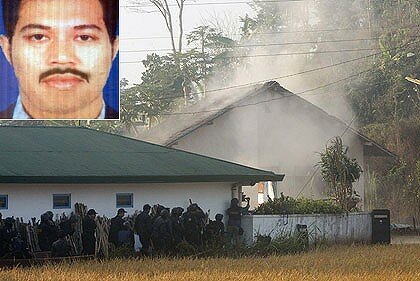
Smoke rises from a house where militants were hiding during a police raid in Temanggung, Central Java, today. Noordin Mohammed Top (inset), the suspected terrorist behind the Jakarta hotel bombings, is believed to have been killed. Photo: Reuters
The federal government is still waiting for confirmation from Indonesian authorities about whether terrorism mastermind Noordin Mohammed Top has been killed.
South-East Asia’s most wanted terrorist was believed to have been killed during a raid on a suspected militant hide-out in central Java on Saturday.
Heavily armed counter-terrorism police stormed the house to end a 16-hour siege that reportedly killed Noordin, who is wanted for multiple suicide bombings in Indonesia.
Local TV stations reported Noordin, 40, who is blamed for last month’s attacks on two luxury hotels in Jakarta, was killed in the bathroom of the house in a rice-growing village after a long bomb and gun battle.
A spokesman for Prime Minister Kevin Rudd said the government was closely monitoring events in Indonesia.
“(We are) in close contact with the Indonesian government,” he said.
“The Australian government is advised that the situation in Indonesia is still developing.
“The government is closely examining reports that alleged terrorist Noordin Top has been killed during the operation but will wait for Indonesian confirmation before commenting further.”
The government backed Indonesia’s efforts to capture those behind terrorist attacks that have killed hundreds.
And Mr Rudd acknowledged family and friends of people who died in those attacks may find it difficult to cope with reports about Noordin’s terrorist activities.
“Days such as today are particularity tough for the families of those victims who lost their lives in terrorist attacks in Indonesia,” his spokesman said.
“The prime minister extends his deepest sympathies to these families on what is yet another very tough day.”
The Malaysian-born Noordin is suspected of involvement in all of Indonesia’s big terror attacks since 2002.
He is thought to be behind last month’s bombings at two Jakarta hotels, which killed nine people, including three Australians and two suicide bombers.
He is also wanted over the first Bali bombings, in which 202 people died, including 88 Australians; the suicide attacks on Jakarta’s JW Marriott hotel in 2003; the raid on Australian embassy in the capital in 2004; and the second Bali bombing in 2005.
_____
Source: AAP






